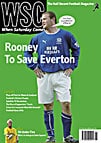 Jon Spurling examines what's afoot at Arsenal in the light of some new books
Jon Spurling examines what's afoot at Arsenal in the light of some new books
In recent months, there has been a growing feeling among Arsenal fans that the club has slipped into a “house of cards” existence. The Glorious Game, Alex Fynn’s latest tome – co-written with The Gooner’s Kevin Whitcher – does little to assuage those fears. One is left feeling that if a single ace in the pack, namely Arsène Wenger, Patrick Vieira, or Thierry Henry, were to depart – or if the proposed move from Highbury is mishandled – then the whole fragile edifice could come crashing down. As an analysis of Arsenal’s current status in English football – and a portend of things to come – The Glorious Game is as good as it gets. Granted unprecedented access to David Dein, youth development officer Liam Brady and most intriguingly Wenger himself, the interviews with the club’s prime movers and shakers reveal a great deal.
Wenger comes across as a curious hybrid of unassuming football obsessive and supreme man manager. He admits: “I can’t switch off from my work,” and away from football lives an almost reclusive lifestyle, watching endless football tapes. Yet Henry’s comment that Wenger “insisted” he could make the switch from winger to striker speaks volumes for the manager’s motivational techniques.
Once described by David Dein as having the “most important” job at Highbury, Liam Brady’s comments are most revealing of all. His frustration at the lack of home-grown players breaking into the first team is apparent. There is the suggestion that the manager prefers to rely on the dedication and superior technique of foreign youngsters, rather than the suspect temperament of Englishmen such as Jermaine Pennant. Brady’s belief that Pennant “only has himself to blame” for failing to break into the first team, combined with the recent departures of Matthew Upson and Francis Jeffers, suggests that the Arsenal team will contain fewer British players as time passes. It is a scenario with which many Arsenal fans are uncomfortable.
The book is not without its faults. Wenger’s early managerial experiences are better covered in Jasper Rees’s recent book The Making Of A Legend, and sifting through the wreckage of a failed Champions League campaign from three years ago seems pointless. But the final two chapters make this required reading for any Arsenal fan brave enough to contemplate the club’s future. Fynn – unintentionally it seems – points out the differences of opinion between David Dein (“You have to be careful you don’t get carried away with Europe”) and the seemingly unquenchable desire of Arsenal’s French contingent for Champions League success. Contrast Dein’s comments with those recently uttered by Sir Alex Ferguson (“Manchester United is all about winning the European Cup”) and one has the feeling that Arsenal will remain essentially a bit part player on the grand stage.
The proposed Ashburton Grove move could change all that, but with the club discovering that assorted sponsorship and TV deals are barely enough to cover the astronomical costs, fans are forced to delve ever deeper into their pockets to provide extra revenue for the club. Season-ticket prices are up by around 20 per cent each season and the club’s commercial department – envious of United’s global brand – relentlessly sell every conceivable form of Arsenal merchandise. The thinly veiled threat to supporters is that unless Arsenal exploit brand loyalty to the full, the vultures, namely Chelsea or Real Madrid, will be ready to feast on the scraps.
The authors’ comments on the inefficiencies of Arsenal’s commercial department mean that the book – no matter how much it deserves to be – will not be stocked in the club shop. Neither will my own literary contribution, Rebels For The Cause – The Alternative History Of Arsenal. Both tomes are regarded as being too subversive, in the rose-tinted land of official quiz books and dream teams. Curious, because as this thought-provoking book shows, the club seems to need every penny it can muster.
From WSC 203 January 2004. What was happening this month